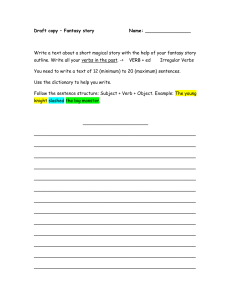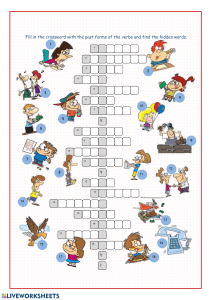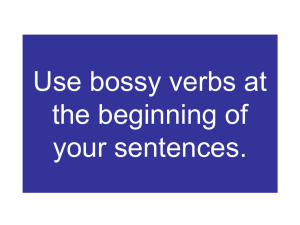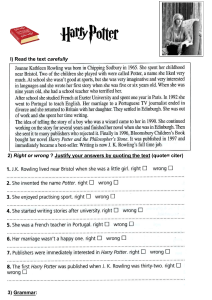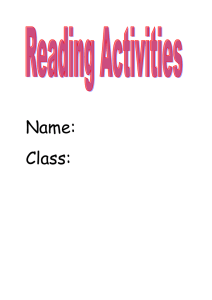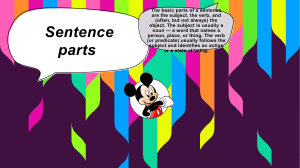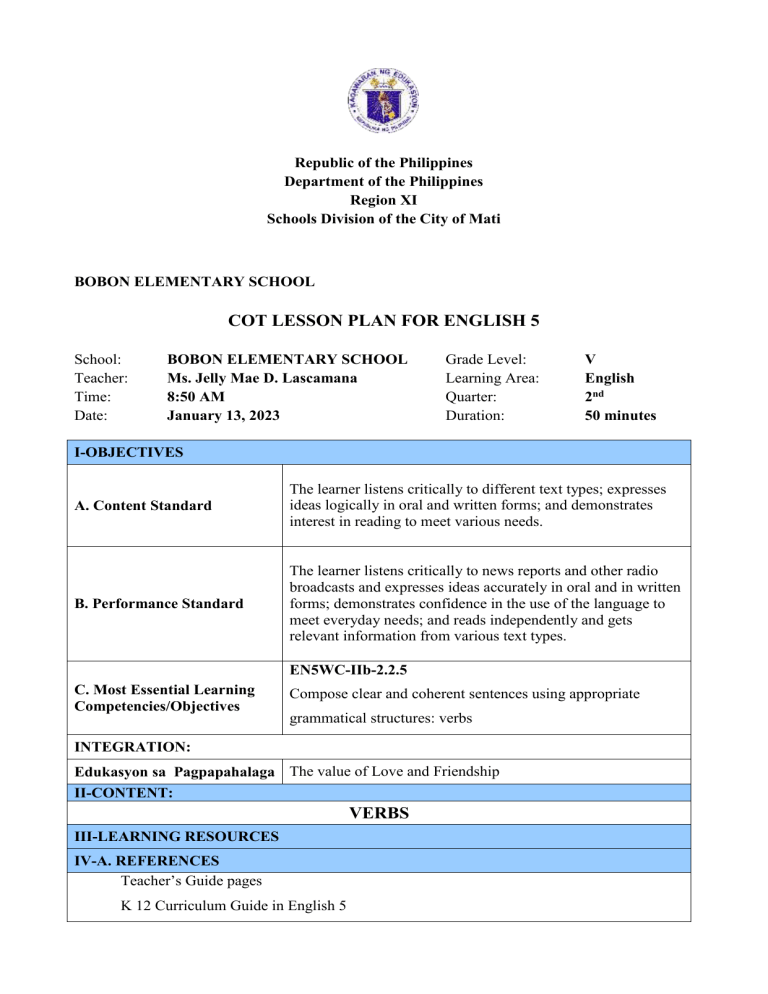
Republic of the Philippines Department of the Philippines Region XI Schools Division of the City of Mati BOBON ELEMENTARY SCHOOL COT LESSON PLAN FOR ENGLISH 5 School: Teacher: Time: Date: BOBON ELEMENTARY SCHOOL Ms. Jelly Mae D. Lascamana 8:50 AM January 13, 2023 Grade Level: Learning Area: Quarter: Duration: V English 2nd 50 minutes I-OBJECTIVES A. Content Standard The learner listens critically to different text types; expresses ideas logically in oral and written forms; and demonstrates interest in reading to meet various needs. B. Performance Standard The learner listens critically to news reports and other radio broadcasts and expresses ideas accurately in oral and in written forms; demonstrates confidence in the use of the language to meet everyday needs; and reads independently and gets relevant information from various text types. EN5WC-IIb-2.2.5 C. Most Essential Learning Competencies/Objectives Compose clear and coherent sentences using appropriate grammatical structures: verbs INTEGRATION: Edukasyon sa Pagpapahalaga The value of Love and Friendship II-CONTENT: VERBS III-LEARNING RESOURCES IV-A. REFERENCES Teacher’s Guide pages K 12 Curriculum Guide in English 5 Learner’s Material pages Textbook pages Online References IV-B. OTHER LEARNING RESOURCES Additional Materials from Learning Resource (LR) portal Metacards, pictures, manila paper, activity sheets V-PROCEDURES A. Reviewing previous lesson or presenting the new lesson Ask the following questions: What was our previous lesson? What is a noun? Give me an example of a noun and use it in a sentence. Give follow-up questions when needed. Show the picture below. B. Establishing a purpose for the lesson Ask the following questions: How will you describe the picture? What did they do? What are the emotions/feelings they demonstrate? (Integrate the value of friendship.) Paste other pictures that show different actions and let the students describe it. C. Presenting/Instances of the new lesson D. Discussing new concepts and practicing new skill #1 Presentation of Lesson: At the end of this lesson you will be able to explain what a verb is and compose a sentence using the different examples of verbs. Explaining to the students what to do. Present the following sentences. Have the pupils read these. My mother cooks my favourite food. The children listen to their teachers attentively. John and his friends play basketball at the gym. Ask the following questions: Which word in each sentence expresses an action? What are the other examples of words that express an action? The teacher will explain that the words used to express an action are called verbs. Modelling for Students Let the pupils read the following examples My friends and I watch our favourite movie. Our parents buy a new cell phone for my sister. E. Discussing new concepts and practicing new skill #2 Explain: A verb is a word that we use to refer to actions (things that we do) and states of being (how things are). Regular verbs form their past and past participle by adding –d or –ed. Examples: walk-walked, dance-danced Irregular verbs are any verbs that do not add –d or –ed to its past tense. Examples: go-went, swim-swam Explain further the difference between regular and irregular verbs. Group Activity The class will be divided into three groups and will be given differentiated activities. F. Developing mastery (leads to formative Assessment 3) Group 1: Identify the verbs used in each sentence. 1. My father buys our favourite toys. 2. She follows the footsteps of her mother. 3. The children play during lunch time. 4. They sing beautifully. 5. Our group perform the story of Cupid and Psyche. Group 2: Determine if the following verbs are regular or irregular verbs. 1. smile 6. Bring 2. walk 7. Talk 3. fly 8. Speak 4. eat 9. Teach 5. form 10. Cook Group 3: Compose clear and coherent sentences using the following verbs. 1. talk 2. write 3. sleep 4. bake 5. go Each group is going to present their output afterwards. Independent Practice Direction: Underline the verbs used in each sentence and write on the blank if it is a regular or irregular verb. G. Finding practical applications of concepts and skills in daily living ________ 1. I borrow his mobile phone. ________ 2. My parents buy a brand new car. ________ 3. My friends and I play a card game. ________ 4. My classmates perform a stage play. ________ 5. We fight for what is right. ________ 6. She looks at her happy friends. ________ 7. They cook a delicious meal for the visitors. ________ 8. The children smile at the old man. ________ 9. I cannot find my umbrella. ________ 10. My friends run as fast as they can. Closure/Assessment H. Making generalization and abstractions about the lesson Ask: What is a verb? How does regular verb differ from irregular verb? What are examples of verb? Compose clear and coherent sentences using the following verbs. I. Evaluating Learning 1. sing 2. collect 3. attract 4. teach 5. forget J. Assignment Compose 5 examples of sentences using the different examples of verbs. VI. REMARKS VII. REFLECTION VIII. OTHERS A. No. of learners who earned 80% of the formative assessment B. No. of learners who require additional activities to remediation C. Did the remedial lessons work? No. of learners who have caught up with the lesson D. No. of learners who continue to require remediation E. Which of my teaching strategies worked well? Why did these work? F. What difficulties did I encounter which my principal or supervisor can help me solve? G. What innovation or localized material did I use/discover which I wish to share with other teachers? Prepared by: JELLY MAE D. LASCAMANA Teacher I Reviewed and checked: MARIA MAGDALENA M. NALZARO Master Teacher I Noted: SILVESTRE T. TUBA Principal II

